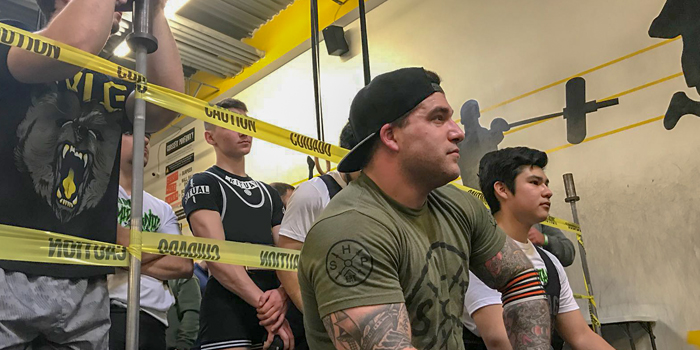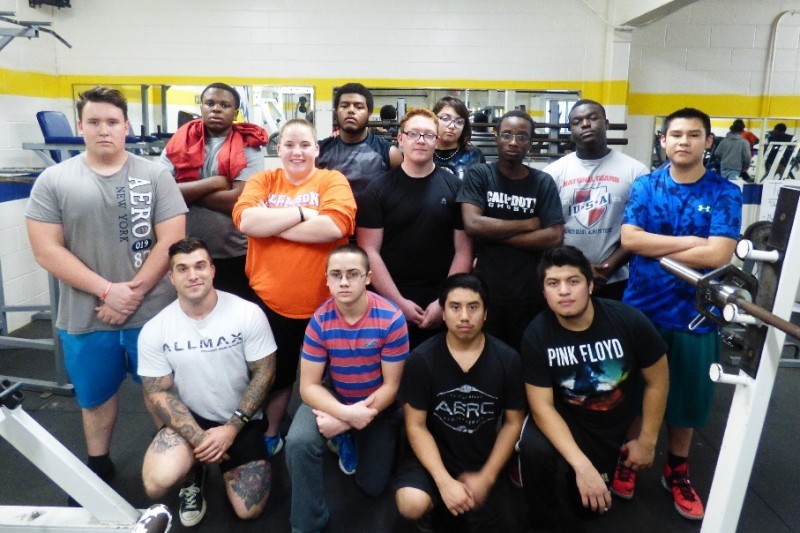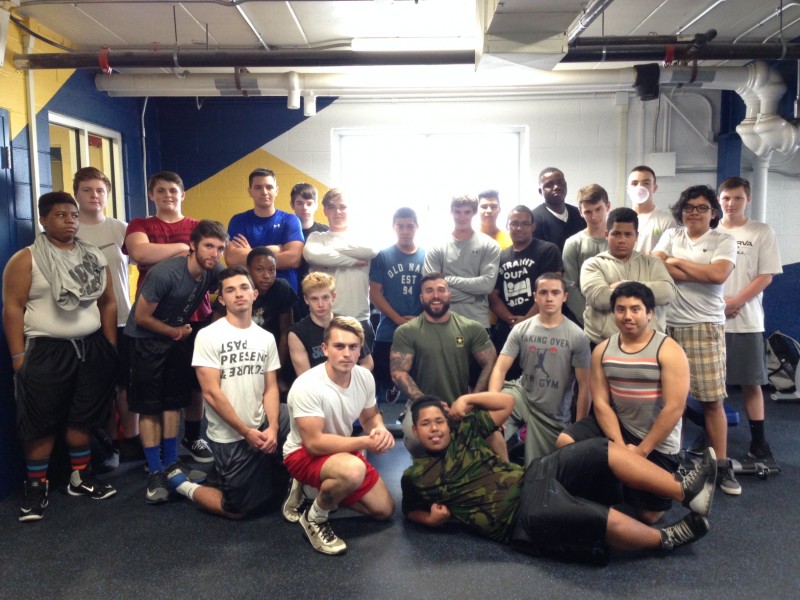
I was clean shaven that day, smiling shyly as I quickened my pace up the football ramp, my eyes glowing wild with excitement. It smelled of despair, a dormant stench of so many seasons lost, enthusiasm as faded as the dull blue and gold banners barely clutching to the walls they adorned. There were few nods of approval from volunteer coaches, even less by the scant team as the door squeaked open, the handle barely holding on as I entered the weight room. Dressed in a gym shorts and a cut-off, outfitted with nothing more than a clipboard and my first whistle, I watched with disbelief: The lack of effort, the blatant disregard for authority, the equipment now 20-plus years old in complete shambles. But even so, stronger athletes have been made by less. I observed coaches yelling poor cues and giving up, just telling the kids to get their "reps in” with no plan or program to be seen. So, I worked out. Rather than sit on the sidelines, I said nothing, put my head down, and went to work. As soon as 500 broke the floor, they all turned.
“How did you do that?” one asked.
“Are you a transfer from another high school?”
“What position do you play?”
“Bro, we gotta get this guy on the field!”
I simply smiled and replied, “I’m your new strength coach, Mr. Rogers.”
That was three years ago, and I am now on my third year of teaching and approaching my fourth summer of coaching. I am 27 years old and work in one of Delaware’s highest-need school districts. Our students range from the ages of 14 to 20 at the senior high school, with most all qualifying for free lunch and breakfast. The English language learner population is staggering, with many of our students coming from Hispanic and Haitian countries and families. We had some of the lowest test scores in the state, and the low-income housing neighborhoods that surround our school, many from which our students walk, are littered with drug busts. However, my aim is not to bring attention to my school or to the students from a negative perspective but rather to showcase that no matter how dark it may be, there is always light.

My kids know my background; a hard drinker, a couch surfer, a functioning alcoholic, and a person who was quick to anger. I tell them stories, and they listen. I think one of the largest reasons they hold on to powerlifting and my afterschool program is because they believe in me. They watch me have my bad and off days just like they do, fail attempts just like they do, and say “fuck it” and not want to push through it just like they do. They have been exposed to so many fake adults who do not show their emotions or who pretend that everything is always fine. My kids respect me because I am real. I am honest with them and tell them how it is. They know I came back from something that otherwise would have made it impossible to have what I have with them now. They know they are coming from bad situations, but they also know that it is not what will dictate who they will become or how hard they can try.
When I first came to the high school, the weight room was nothing. A small cramped space with broken equipment, a graveyard of past efforts for the past 20 years, void of hard work. The bench cushions were ripped and taped up, the staples and bits of vinyl stabbing you with each repetition. You practically needed a tetanus shot just to be in there. The bars were cheap and rusted over, the sour stench of spoiled steel permeating the hallway, even with the doors shut. It was sad, but we owned it, and it became mine.
We first moved trashed equipment to the corner of the room we dubbed “the heap.” It contained all of the worthless and broken materials, bent bars, cracked weights, and benches that were too dangerous to use anymore. Those first few days consisted of very small workouts, if any, mainly organizing the space in a loop to be more efficient and allow the kids to follow at least a station rotation. This was until proper programming could be introduced into the mix, and once the school year started after that summer, we did just that. We had long talks that summer, talks about what it means to be a man, what carry-over weights could have for everyday life, and how doing this day in and day out could shape more than just your body. Interest grew in me and in the sport, many unaware of powerlifting as its own entity and not simply as a tool to prepare for football or track. It offered these kids something they hadn’t seen before or been accustomed to, a place where their frustrations were personified into goals, where fury and need and want became physical objects that were no longer emotions, but tangible objects one could move. Diehards came from that small group that summer, and thus the barbell club was born.
That initial full year moved quickly. The group grew from five to 10 that came every day, with another 10 that rotated in and out because of jobs and other sports. It was fragile and tiny at first, the program mimicking the bodies involved in it, but it was something, and better yet something that hadn’t been done before. We tracked numbers and goals on a beat-up whiteboard, so far gone now I can barely recall what it looked like. I remember long days on the old plate loaded hack squat dual leg press, and accidentally missing a squat that bent one of the cheap power bars damn near in half. I really wasn’t as gifted as a lifter as I have grown into now, but the kids knew what I was capable of, and watched how fired up I could get myself. It drove them to push harder, and it did the same for me. The rumors started, and they make me still smile thinking about it, knowing how kids are. Talks of me lifting cars, squatting 1,000 pounds, all kinds of crazy stuff that I’m not capable of, but that was the beauty of it. That singular belief. I was offering something to the kids I never knew I had in me, and that was hope. Hope that they could become legend, to tell stories with Big Rog, to train alongside me and look back when all else failed them and say “That man was my coach, best friend, my brother, and my dad.” I was giving them something many never thought they could have. A sense of community, value, family and safety in numbers. I had created a pack, a bear to all these cubs. The day I was first called “Dad” by multiple lifters, it all changed for me, and it has been for them ever since.
I cried afterschool in that parking lot more times than I could count that first year, mostly from joy, but other times doubting if I could be the man and father figure that these kids deserved, something I will never be ashamed to admit. This has always been bigger than me, and it always will be. I find myself seldom doing this for records or personal gain, despite the selfishness of the sport. I always try to be that legend to those kids, to put on a fucking show, to make them talk. For those 30 or so seconds under the bar, it is always for them, for the high fives, for those silent head nods, the chalk-covered pats on the back. When the dust settles and I turn the lights off in that weight room for that final time, what legacy will I leave, how many lives did I touch? It is an answer and ratio I will never know or explain, but I am only getting started.
Travis resides in the small beach town of Ocean City, Maryland, where he teaches at Seaford High School as an English language arts teacher and strength coach. He's been competing in powerlifting in both the USPA and RPS federations actively for two years and is currently prepping for USPA Nationals in Vegas.












This article is pure proof you can work hard and give back and still have a life to be proud of. Pop Rodgers has inderectly shown me how to be not only a better lifter, but a better person. He has taught me with literally no effort on his part that there are no cielings, no boundaries, no end to what I'm capable of.
I see it like this: If a guy 5 years my younger and a foot shorter than me can do it, well goddamn it I can too.
Great read, great guy. Hope to see more articles like this from the caliper of people like Travis.
Keep doing your thing Travis!!!!!!!!